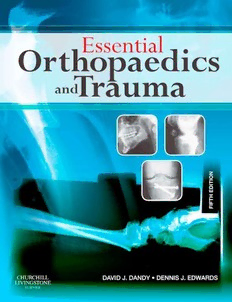
Essential Orthopaedics and Trauma PDF
Preview Essential Orthopaedics and Trauma
Essential Orthopaedics Trauma and Commissioning Editor: Alison Taylor Development Editor: Kim Benson Project Manager: Joannah Duncan Designer/Design Direction: Charles Gray Illustration Manager: Bruce Hogarth Essential Orthopaedics Trauma and Fifth Edition David J. Dandy MD MA MChir FRCS Emeritus Consultant Orthopaedic Surgeon, Addenbrooke’s Hospital, Cambridge, UK Dennis J. Edwards MBChB, FRCS(Orth) Consultant Orthopaedic Surgeon, Addenbrooke’s Hospital, Cambridge, UK Edinburgh London New York Oxford Philadelphia St Louis Sydney Toronto 2009 © Longman Group UK Limited 1989, 1993 assigned to Pearson Professional Ltd 1995 © Pearson Professional 1998 © Harcourt Publishers Limited 1999 © Elsevier Science Limited 2003 © 2009, Elsevier Limited. All rights reserved. No part of this publication may be reproduced or transmitted in any form or by any means, electronic or mechanical, including photocopying, recording, or any information storage and retrieval system, without permission in writing from the publisher. Permissions may be sought directly from Elsevier’s Rights Department: phone: (+1) 215 239 3804 (US) or (+44) 1865 843830 (UK); fax: (+44) 1865 853333; e-mail: [email protected]. You may also complete your request on-line via the Elsevier website at http://www.elsevier.com/permissions. First published 1989 Second edition 1993 Third edition 1998 Fourth edition 2003 Reprinted 2004, 2006 Fifth edition 2009 ISBN: 978-0-443-06718-1 International Edition ISBN 978-0-443-06717-4 British Library Cataloguing in Publication Data A catalogue record for this book is available from the British Library Library of Congress Cataloging in Publication Data A catalog record for this book is available from the Library of Congress Notice Knowledge and best practice in this field are constantly changing. As new research and experience broaden our knowledge, changes in practice, treatment and drug therapy may become necessary or appropriate. Readers are advised to check the most current information provided (i) on procedures featured or (ii) by the manufacturer of each product to be administered, to verify the recommended dose or formula, the method and duration of administration, and contraindications. It is the respon- sibility of the practitioner, relying on their own experience and knowledge of the patient, to make diagnoses, to determine dosages and the best treatment for each individual patient, and to take all appropriate safety precautions. To the fullest extent of the law, neither the Publisher nor the Authors assume any liability for any injury and/or damage to persons or property arising out or related to any use of the material contained in this book. The Publisher Working together to grow libraries in developing countries The www.elsevier.com | www.bookaid.org | www.sabre.org publisher’s policy is to use paper manufactured from sustainable forests Printed in China Contents Preface to fifth edition...............................vii 14. Injuries to the lower limb .....................239 Acknowledgement ........................................ix 15. Sports injuries ........................................283 Preface to first edition .................................xi Part 3 Orthopaedics Part 1 Background knowledge 16. Osteoarthritis .........................................293 17. Rheumatoid arthritis and other 1. Introduction ...............................................3 arthropathies ..........................................301 2. History and clinical examination .............9 18. Bone and joint infections .....................311 3. Orthopaedic anatomy .............................33 19. Metabolic disease, dysplasias, 4. Basic science in orthopaedics .................45 osteochondritis and neurological disorders .................................................317 5. Investigations ...........................................55 20. Granulomatous disorders and 6. Methods of treatment ..............................69 tumours ..................................................335 21. Deformities in children .........................347 Part 2 Trauma 22. Disorders of the shoulder and elbow ..365 7. The principles of managing trauma .......93 23. Disorders of the wrist and hand ..........375 8. Immediate care and major incidents ...115 24. Disorders of the hip and knee ..............393 9. Methods of managing trauma ..............123 25. Disorders of the ankle and foot ...........429 10. Injuries to the face, head and spine .....145 26. Disorders of the spine ...........................445 11. Injuries to the trunk ..............................167 Glossary .......................................................467 12. Injuries to the upper limb ....................185 13. Hand injuries .........................................221 Index ............................................................473 v This page intentionally left blank Preface to fifth edition Again, this edition has kept the same basic layout as well as an update of the newer methods of manag- previous editions. All have been, we hope, simple ing trauma cases. In particular, locking plates have to read and useable as either an undergraduate or changed our method of fixing juxta-articular and postgraduate student. Although orthopaedic surgery osteoporotic fractures. remains a constantly changing specialty, the essen- D.E. tial core knowledge remains the same. D.J.D. There is now more emphasis on the biological Cambridge 2009 approach to chondral repair and gene therapy as vii This page intentionally left blank Acknowledgement I remain indebted to David Dandy for his support, for his encouragement, and for allowing me to con- tribute to this book. He is a wonderful teacher and an even better colleague! Thank you. D.E. ix
